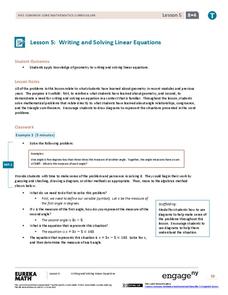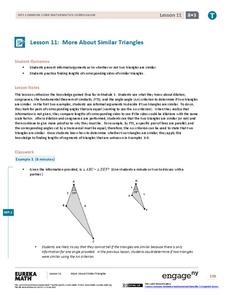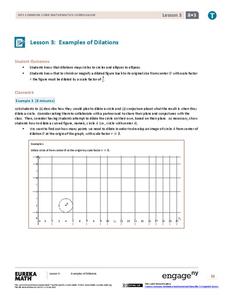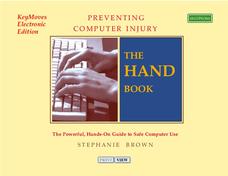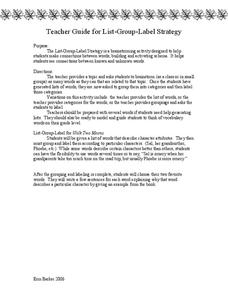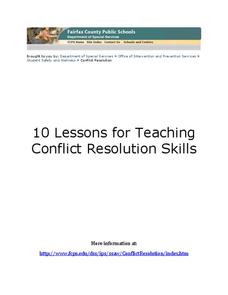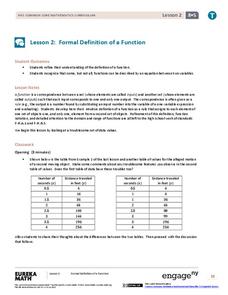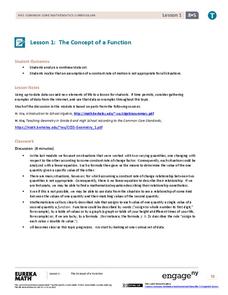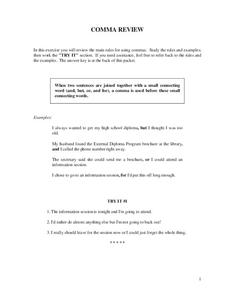EngageNY
Writing and Solving Linear Equations
Incorporate geometry into the solving linear equations lesson. Pupils use their knowledge of geometry to write linear equations which reinforces geometry measurement concepts while at the same time providing a familiar context for...
EngageNY
Solving a Linear Equation
Solving an equation is the art of creating simpler equivalent equations using properties of equality. Here, classes see that solving an equation is not always as easy as guessing. The lesson presents linear equations that scholars must...
EngageNY
Linear Equations in x
What does it mean to solve an equation? The resource revisits the concept of making a linear equation true. Classmates use algebraic methods to transform sides of equations to expressions with fewer terms. They use substitution to...
EngageNY
Writing Equations Using Symbols
Build upon prior equation writing experience to create more complicated equations. Lesson one in a 33-part unit builds upon the class members' sixth and seventh grade experience of writing linear equations. Several examples...
EngageNY
More About Similar Triangles
Determine whether two triangles are similar. The lesson presents opportunities for pupils to find the criterion needed to show that two triangles are similar. Scholars use the definition of similarity to find any missing side...
EngageNY
Examples of Dilations
Does it matter how many points to dilate? The resource presents problems of dilating curved figures. Class members find out that not only do they need to dilate several points but the points need to be distributed about the entire curve...
Khan Academy
Challenge: SmileyFace
Two smiley faces are better than one. The interactive lesson challenges pupils to use methods to alter a program to make it more efficient. Individuals use the new code to create multiple smiley faces that speak. The engaging activity is...
Khan Academy
Challenge: Double Rainbow
Draw a rainbow over the rainbow. The second segment in a series of six has the class practice using functions to edit a program that draws a rainbow. After creating the function, the interactive lesson challenges pupils to create another...
University of Colorado
Using Spectral Data to Explore Saturn and Titan
Saturn's rings are made of dust, ice, and solid chunks of material. Individuals use spectrographs in this final installment of 22 lessons to determine the atmospheric elements. They analyze spectrums from Titan's atmosphere and...
EngageNY
Fundamental Theorem of Similarity (FTS)
How do dilated line segments relate? Lead the class in an activity to determine the relationship between line segments and their dilated images. In the fourth section in a unit of 16, pupils discover the dilated line...
University of Colorado
Distance = Rate x Time
Every year, the moon moves 3.8 cm farther from Earth. In the 11th part of 22, classes use the distance formula. They determine the distance to the moon based upon given data and then graph Galileo spacecraft data to determine its movement.
Ergonome
Preventing Computer Injury
Do your hands cramp up after a long day of typing? Learn the proper and ergonomic ways to type on a keyboard with a helpful "hand" book. From relaxing elbows and wrists to massaging and stretching tired hands, the strategies in the book...
Novelinks
Walk Two Moons: List-Group-Label
Use a vocabulary asssignment as a quick activity between reading chapters of Walk Two Moons by Sharon Creech. Young readers choose their favorite words from the vocabulary word list to describe Sal, Phoebe, or any other character from...
Conflict Resolution Education Connection
10 Lessons for Teaching Conflict Resolution Skills
Promote responsibility and camaraderie with 10 lessons on conflict resolution. Learners define conflict and teach ways to resolve it. Each lesson provides an activity and scenario for role play, and lends itself to discussion among...
EngageNY
Graphs of Simple Nonlinear Functions
Time to move on to nonlinear functions. Scholars create input/output tables and use these to graph simple nonlinear functions. They calculate rates of change to distinguish between linear and nonlinear functions.
EngageNY
Comparing Linear Functions and Graphs
How can you compare linear functions? The seventh installment of a 12-part module teaches learners how to compare linear functions whose representations are given in different ways. They use real-world functions and interpret features in...
EngageNY
Graphs of Linear Functions and Rate of Change
Discover an important property of linear functions. Learners use the slope formula to calculate the rates of change of linear functions. They find that linear functions have constant rates of change and use this property to determine if...
EngageNY
Graphs of Functions and Equations
Explore the graphs of functions and equations with a resource that teaches scholars how to graph functions as a set of input-output points. They learn how the graph of a function is the graph of its associated equation.
EngageNY
More Examples of Functions
Discrete or not discrete? Individuals learn about the difference between discrete and non-discrete functions in the fourth installment of a 12-part module. They classify some examples of functions as being either discrete or non-discrete.
EngageNY
Linear Functions and Proportionality
Connect linear equations, proportionality, and constant rates of change to linear functions. Young mathematicians learn how linear equations of the form y = mx + b can represent linear functions. They then explore examples of linear...
EngageNY
Formal Definition of a Function
Formalize the notion of a function. Scholars continue their exploration of functions in the second lesson of the module. They consider functions as input-output machines and develop function rules for selected functions.
EngageNY
The Concept of a Function
Explore functions with non-constant rates of change. The first installment of a 12-part module teaches young mathematicians about the concept of a function. They investigate instances where functions do not have a constant rate of change.
Khan Academy
Challenge: Flower Grower
How does the garden grow? With inherited functions! The interactive activity has individuals alter a program to utilize object inheritance. Scholars develop an object type that two other objects use to inherit similar aspects. The...
National External Diploma Program Council
Comma Review One
Commas are helpful for separating names of cities from states, setting off interjections, and listing items in a series. Practice the many uses of commas with a set of grammar exercises designed for both elementary and middle school...
